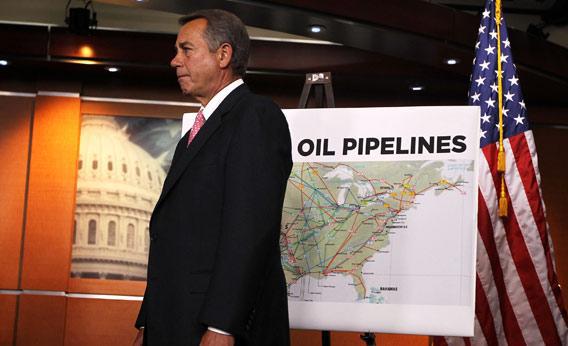THE VILLAGES, Fla.—Newt Gingrich’s schedule, 72 hours before the Florida primary, goes like this: church, parking lot of a retirement mega-city, church. His only speech of the day is here, in a grove of tidy homes and souped-up golf carts. As the Villagers stand, or sit in their chairs, or stay in their carts to sip Arizona Iced Tea or frappes, Gingrich explains why Barack Obama is failing them.
“He recently vetoed the Keystone pipeline,” says Gingrich.
Boo! Boo! Boo!
“Now, think about it! He did it to appease left-wing environmental extremists in San Francisco.”
Ugh, mutters a retiree near the press riser. Gingrich laid on the scares with a trowel; an ugh was the least he could do.
“Think about what would come of this,” Gingrich continues. “Here was an opportunity to have oil come from Canada through the United States, to the largest petrochemical complex in the world, in Houston. It would have provided jobs for the next 50 years, processing the oil, sending some of it to the ports overseas, so you’d got jobs for the ports, jobs for the refineries, jobs from building the pipeline. He canceled all that. Right now the Canadians are looking seriously at a partnership with China.”
From what I could gather, Gingrich’s audience knew about the Keystone XL pipeline before he started talking. They felt the same way he did.
“For Obama not to do it is a disgrace to this country,” said Bob Levens, a retiree with his shoulder in a sling—a necessity before surgery on some torn muscles. (Consolation prize: Rick Santorum had signed the sling.) “He is stopping the workforce and the energy that we need right now. I don’t know where his thinking is. He’s giving $1 billion to George Soros to start buying oil from South America, from Hugo Chavez.”
Jim Oddie, a scuba instructor who’d driven an hour to see Gingrich, ticked off the reasons Obama might have nixed the pipeline. “He doesn’t play for our team,” he said. “He wasn’t raised in the mainland of the United States. He doesn’t think America is exceptional. Come on—he grew up in Hawaii in 1961 when it had been a state for less than two years. Spent time in Indonesia.”
If Newt Gingrich loses Florida, his attacks and tweaks and talking points will be written off; they didn’t work. That’s the wrong way to think about Gingrich. If he loses, he’s returning to the role he held before his presidential bid: a pundit with a psychic bond to the conservative base and a knack for explaining what they should be scared of.

Alex Wong/Getty Images.
The Keystone panic is a perfect example, one that will last and last. It’s not even up to Gingrich—Republicans in Congress are hugging the pipeline so tight that it’s squeaking. House Republicans want to keep attaching pipeline approval to must-pass bills. Sen. John Hoeven, a North Dakota Republican, wants to pull the power of approval from the executive to the legislative branch. In his “State of the Union response,” a speech given in Tampa under a giant “OBAMA ISN’T WORKING” banner, Mitt Romney called Keystone “a real ‘shovel-ready’ project that would put 20,000 Americans back to work.” This is a general election message, even if Gingrich doesn’t get to the general election.
So we have a winning campaign line, three parts attitude to one part facts. The facts: The pipeline delay was a big victory for environmentalists (some of whom live outside of San Francisco). The delay does push approval past the election, and if Obama’s re-elected, TransCanada will probably have to come up with an alternate route. Nixing the pipeline meant nixing some number of construction jobs; labor unions were arm-in-arm with energy companies, predicting 20,000 careers if the pipeline went from Alberta to Houston, not Alberta to Vancouver.
But the pipeline means so much more. “I’ll tell you what I really think,” said Beth Campbell, after she, Gingrich, and a few thousand other people attended a church service in Lutz, Fla. “He wants us to be dependent on foreign countries.” Mary Gaulden, a Republican activist who got a picture with Gingrich after the service, explained why Obama’s lack of faith led him astray. “We don’t need regulators, we don’t need the EPA,” she said. “God created this world. He put resources here so that we could use them.” Back in the Villages, a retiree named Gerald Franck explained the pipeline delay as an example of Obama “sabotaging” the country, on purpose.
This is petro-populism, something Gingrich has always been good at. Sarah Palin gets all the credit, but it was Gingrich who kicked off the “drill, baby, drill” meme. His slogan, expanded (of course) into a book, was “drill here, drill now, pay less.” After he coined that phrase, oil companies cut Adelson-sized checks for his 527, helping to fund a campaign much more credible-sounding than, say, the American Petroleum Institute ads that play between Sunday talk shows. Energy companies wanted something; voters wanted it, too. The trick of any good industry campaign is to blur the relationship so that no one takes credit, and to make the idea so powerful that anyone who’s opposed is addled, on the take, or worse.
Their argument is tauter than the Democrats’ argument. The oil-for-China line, for example—it’s clever to say that oil prices depend on where the boats take the barrels, not on the overall amount of oil in the market. At the Villages, as the stage and equipment is packed away, Jim Oddie explains it in baseball terms.
“You remember Pete Rose?” he asks. “He’s banned from baseball, banned from the Hall of Fame, because he bet on his team to win. Obama’s supposed to be the manager of our team. And he bets against it.
